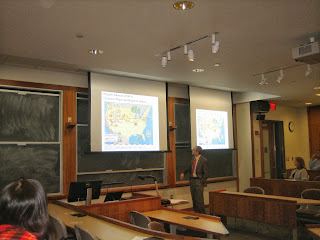Today, we had the distinct honor and pleasure of hearing Dr. Robert Shumsky of the Tuck School of Business at Dartmouth present the lecture, "Frenemies: Price Competition between Codesharing Airlines," as part of the Isenberg School Dean's Lecture Series at UMass Amherst. He presented this airline codeshare work which was done with Sandra Transchel of the KLU:
http://www.the-klu.org/transchel/
In the morning, Dr. Shumsky met with faculty and our doctoral students and, after lunch at the University Club, which is in a building dating to 1728, regaled us with his research. In his talk, he discussed his modeling work of two codesharing airlines that operate parallel flights, flight legs between the same origin and destination that operate roughly at the same time. Because the flights are close substitutes the airlines are competing for many of the same customers. You can probably think of some international flights that you have considered that fit these assumptions.
He discussed his dynamic game theory model, under which each codeshare partner dynamically adjusts the prices for seats on its own flight as well as seats on its partner's flight. He contrasted a single time period solution with a multiperiod one with the latter having some fascinating results -- I'll keep you in suspense.
I very much appreciated his incredible energy and interactions with the audience and that he also emphasized the importance of theory -- something I emphasize in my doctoral courses at the Isenberg School and even spoke of the existence and uniqueness of solutions of the Nash equilibrium problem(s).
His talk generated many interesting questions because who does not like to get great prices on international flights?! One question from a doctoral student from South Africa was about how a business class ticket he had booked on Iberia which code shares with British Airways could be $1,500 versus $3,000 and to complicate matters further Finnair also codeshares with the latter.
The photos below were taken today -- I do not take credit for the first "tipsy" one.
Dr. Shumsky also told me the story of how he came to study Operations Research (O.R.) for his PhD at MIT -- Jon Caulkins of CMU, who was then at MIT, deserves credit for this. What is so great about O.R.
is its applications, which really puts math into action and practice!
About Me
- Dr. Anna Nagurney
- Dr. Anna Nagurney is the Eugene M. Isenberg Chair in Integrative Studies at the Isenberg School of Management at the University of Massachusetts Amherst. She was appointed to this chaired professorship on April 14, 2021. Prior to this chaired professorship, since 1998, she was the John F. Smith Memorial Professor of Operations Management. She is the Founding Director of the Virtual Center for Supernetworks, which she established in 2001. Professor Nagurney has held positions at Harvard, MIT, Brown University, Oxford University, the Royal Institute of Technology (KTH), the University of Gothenburg, and the University of Innsbruck. She is the author/co-author of over 235 journal articles and over a dozen books. Nagurney is regularly sought out by major media outlets because of her expertise on supply chains and networks systems plus policies. She has given many keynote and other invited talks internationally.
Subscribe To RENeW


Recent Visitors
Blog Archive
-
▼
2013
(177)
-
▼
September
(14)
- Politics of Sustainability -- India and China
- Brilliant Lecture by Dr. Robert Shumsky of Tuck Sc...
- Network Economics of Cyber Crime
- Financial Networks -- Special Issue of Computation...
- Google Scholar -- The Swedes Made Me Do it and Why...
- Women in Operations Research and the Management Sc...
- Operations Research and Healthcare with Dr. Hari B...
- Dr. Robert Shumsky of Dartmouth to Speak in Isenbe...
- Great News for the UMass Amherst INFORMS Student C...
- Photos from the Fabulous Supply Chain Workshop in ...
- Fabulous Workshop on Supply Chain Vulnerability an...
- Some of the First Years Had Never Had a Female Pr...
- Information on the Network Frontier Workshop at No...
- The Joy of Revising a Scientific Research Paper
-
▼
September
(14)





















